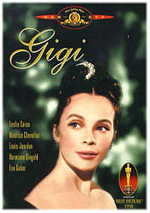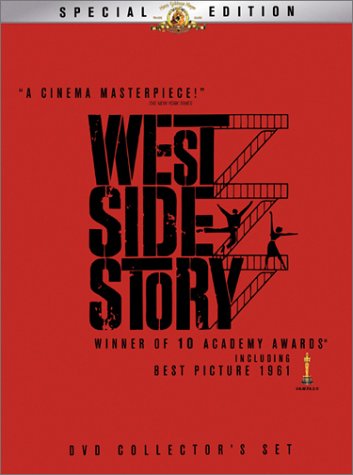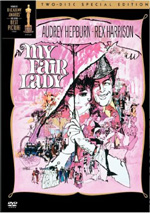|
MGM
|

| |
|
MOVIE INFO
|
|
Director:
Vincente Minnelli
Cast:
Leslie Caron, Maurice Chevalier, Louis Jourdan, Hermione Gingold, Eva Gabor, Jacques Bergerac, Isabel Jeans, John Abbott
Writing Credits:
Colette (novel), Alan Jay Lerner
Tagline:
The First Lerner-Loewe Musical Since My Fair Lady.
Synopsis:
Set in Paris at the turn of the century, this delightful Lerner and Loewe musical, based on a story by Collette, follows a precocious French girl as she is groomed into a would-be courtesan, blossoming into a stunning woman. The story provides plenty of opportunity for Minnelli and MGM to pull out all the stops in its first musical production shot on location. Paris and Caron never looked lovelier, and Jourdan and Chevalier are so French, no? Songs include: "Gigi," "Thank Heaven for Little Girls," and "Ah, Yes, I Remember It Well."
Box Office:
Budget
$3.319 million.
Domestic Gross
$7.321 million.
MPAA:
Rated G
| |
|
DVD DETAILS
|
Presentation:
Widescreen 2.35:1/16X9
Fullscreen 1.33:1
Audio:
English Dolby Digital 3.0
French Monaural
Subtitles:
English
French
Closed-captioned
Supplements Subtitles:
None
Runtime: 116 min.
Price: $19.98
Release Date: 5/2/2000
Bonus:
• Trailer
• Booklet
| |
|
PURCHASE @ AMAZON.COM
|

| |
|
EQUIPMENT
|
Panasonic 50" TH-50PZ77U 1080p Plasma Monitor; Harman/Kardon DPR 2005 7.1 Channel Receiver; Toshiba A-30 HD-DVD/1080p Upconverting DVD Player using HDMI outputs; Michael Green Revolution Cinema 6i Speakers (all five); Kenwood 1050SW 150-watt Subwoofer.
| |
|
RELATED REVIEWS
|


| |
[an error occurred while processing this directive]
|
Gigi (1958)
|
|
Reviewed by Colin Jacobson (October 9, 2008)
Yay! My trek through four straight Best Picture-winning musicals nears its end! Despite my distaste for the genre, I found West Side Story and especially My Fair Lady to offer surprisingly enjoyable experiences. Would 1958's Gigi make it a hat trick?
Nope, though the prospect seemed possible when one considers Gigi's pedigree. After all, it was penned by Lerner and Loewe, the team that experienced so much success with the stage production of Lady, and it even shared some of the same talent with that movie, such as production designer Cecil Beaton.
Gigi displays other qualities in common with Lady, such as a similar plot. Basically both films concern the social grooming of a couple of young women. However, Eliza Doolittle was taken from a situation in which she was poor, uncouth and unhappy to a place where she became successful and loved; although they occurred for callous and mercenary reasons, clearly Henry Higgins' interventions were positive.
The same seems less certain in Gigi. At the start, our title character - played by lovely Leslie Caron, who feels believably teenaged although she was actually 27 years old at the time - is a happy, exuberant young lady in turn of the 20th century Paris. Playboy Gaston (Louis Jourdan) feels bored with all the silly social climbing in the city and he becomes taken with Gigi's irrepressible charm.
So far so good, right? Sounds like a standard formula for a nice romantic ending. Well, yes and no. (Note: if you don't want to know how the movie concludes, jump ahead now! I try to avoid anything that resembles a spoiler, but I need to discuss the ending to make it clear why I disliked the film.)
Once it becomes clear to Gigi's meddling Aunt Alicia (Isabel Jeans) that she can latch onto hunky Gaston, she intensifies the grooming lessons she'd already put into place for Gigi. Toward the end of the film, it becomes clear that these have made Gigi into exactly the kind of vapid, status-obsessed bimbo of the sort Gaston had become tired. When he recognizes this, he initially goes ballistic, but then mysteriously rethinks things and goes back to hook up with her again. The end, but was it a happy or logical one?
Not in my book. I kept wondering if I missed something. I expected a scene in which Gaston told Gigi that he didn't care about her refined personality and he wanted the exciting little babe she used to be. However, that never occurred. Gaston comes back to Gigi in her phony and manipulated state, theoretically to live happily ever after. Score one for the Stepford wives.
Even if I'd enjoyed the prior portions of the film, that ending would have left me cold. As it stands, the majority of Gigi is a lovely trifle. It presents some gorgeous vistas and costumes, and the tunes are relatively tolerable, though I must admit that hearing 70-year-old Maurice Chevalier croon "Thank Heaven For Little Girls" seems creepy in today's climate. It's not actually a paean to pedophilia - after all, Chevalier makes it clear he digs little girls because they get big eventually - but it comes uncomfortably close to that territory.
In any case, other than pretty pictures and some hummable songs, Gigi has little to offer. I got the feeling the whole project existed to capitalize on the stage success of Lady. Apparently it took quite a while to negotiate screen rights for the latter, so Gigi looks like an attempt to cash in via a similar property.
It doesn't work. Yes, Lady features a pretty slim plot as well, but at least the characters are interesting and the situations entertaining. Nothing in Gigi seems clever or compelling, and that ending really harms the entire project. Ultimately, it's a dull, lifeless production that made me wish I was watching Lady instead.
|
The DVD Grades: Picture D/ Audio B-/ Bonus D-
|
|
Gigi appears in both an aspect ratio of approximately 2.35:1 and in a fullscreen version on this double-sided, single-layered DVD; the widescreen image has been enhanced for 16X9 televisions. Only the letterboxed picture was reviewed for this article. Plenty of problems materialized in this ugly transfer.
At best, the film showed mediocre definition, as sharpness never seemed better than average. Many scenes displayed a dull softness that made them appear blurry and unfocused. A lot of this came from the moderate edge enhancement present throughout the film. Haloes cropped up frequently and created an image without much clarity.
Moiré effects and jagged edges were not problems, but source flaws became much more of an issue. Plenty of specks, lines, nicks and marks cropped up through this consistently dirty print. I even noticed an odd frame jump during “Thank Heaven For Little Girls”, and plenty of defects marred the presentation.
Colors tended to be oversaturated and heavy. A few shots demonstrated pretty good vivacity, but the hues usually seemed too dense, a factor that made them unappealing. The film often looked like someone had turned up the “color” setting on the TV all the way to the right. Black levels could be slightly too dark at times, though this was actually one of the better aspects of this transfer.
Shadow detail wasn't much of a concern in this brightly-lit movie. In fact, the only time I really noticed it was toward the end when Jourdan did a nighttime number. I thought the shadows were appropriately opaque without much heaviness. Ultimately, Gigi looked pretty bad. Even though I didn’t like the movie, I thought it deserved better than this unappealing transfer.
Gigi offered a Dolby Digital 3.0 soundtrack. That simply meant that only the front three speakers were active. As with the picture, the audio had some serious strengths and weaknesses. On the positive side, the music displayed fine stereo separation and breadth, and the songs all sounded very clear and crisp. Since this was a musical, it's very important that the tunes were portrayed in the best possible light, and this presentation did nicely.
Dialogue was a different matter. For the most part, I found speech to sound clean and acceptably natural. Recordings from the era always betray some thinness, but the dialogue here seemed relatively warm. Unfortunately, the sound mixers went a little nuts with the three-channel capabilities and spread speech all over the place. It jumped from center to side to side with abandon, and it could become distracting. It's nice that they showed some ambition, but it didn't work very well, as the dialogue stuck too harshly to each speaker when it moved; there's no smoothness to the transitions.
Effects also panned between channels, but this was done to a more gentle degree so it's not as problematic. Nonetheless, every once in a while the audio couldn't keep up with the action; the object would reach the side of the screen before the accompanying effect could get there.
I also noticed occasional lip-synch problems, which were more evident during songs. Some of the speech was dubbed awkwardly, and at times during music, the mouths just didn't match the lyrics well. I don't know if this was always a problem with the movie or if it is new to this DVD transfer, but it could be a distraction. I also heard a mild layer of tape hiss during much of the film. Despite these flaws, it must be remembered that Gigi was recorded five decades ago, so it couldn't compete with more modern affairs. Enough of it worked well to earn it a solid age-curved "B-".
Less acceptable are the supplemental features on the DVD. All we find is the movie's theatrical trailer. Actually, this is an interesting clip, since it shows the different ways that films were distributed back then. Apparently Gigi opened on Broadway first - as a movie, not as a stage production - and then spread across the country. It's funny to see them tout the film's success in a trailer for an initial release; usually those pronouncements go along with reissues, but it seems clear that this ad is for the movie's original general run. In this day and age when most films go from screen to video in half a year or less, it's also stunning to hear a critic's statement that the movie may run for three years!
I don't know if it displayed such longevity, but if that kind of run did occur, I know Gigi didn't deserve such success. The film is a triumph of form over substance. While Gigi looks lovely, it portrays a shallow plot with some distasteful components. The DVD offers fairly good sound but it comes with poor picture quality and it skimps on extras. Gigi isn't a terrible movie, but it certainly didn't merit its long list of Academy Awards and it isn't a DVD you should pursue.
To rate this film, visit the Special Edition review of GIGI
|
|

